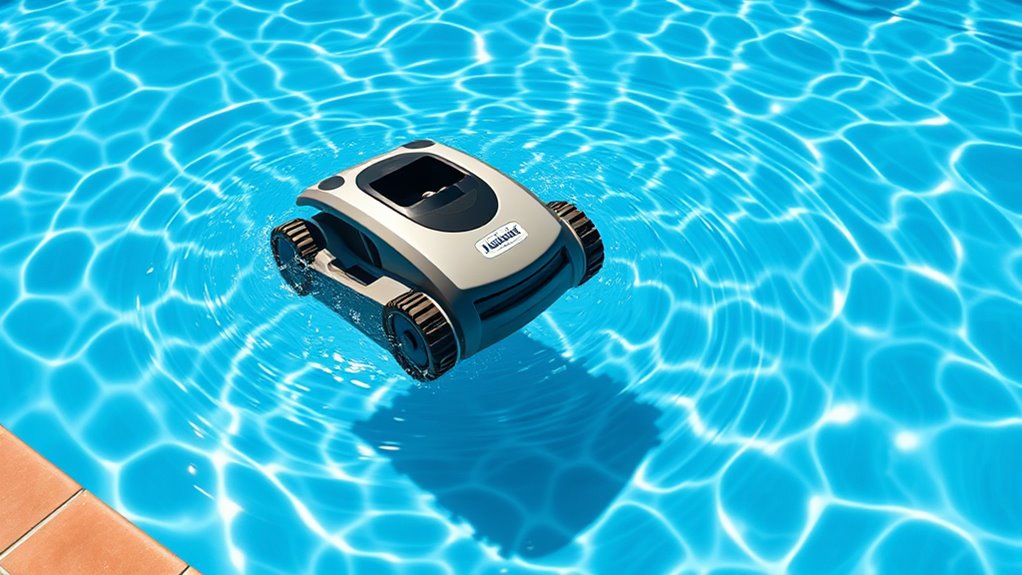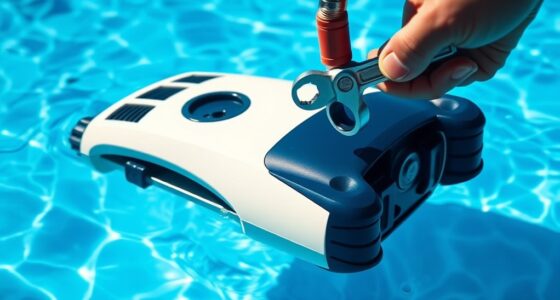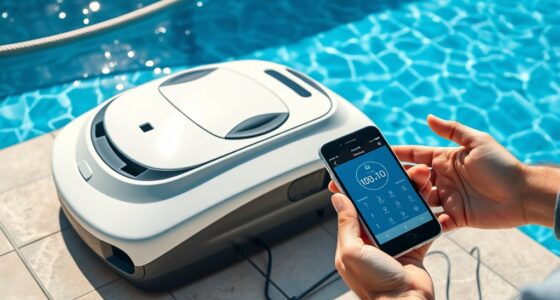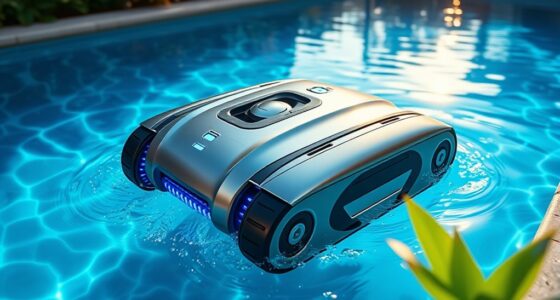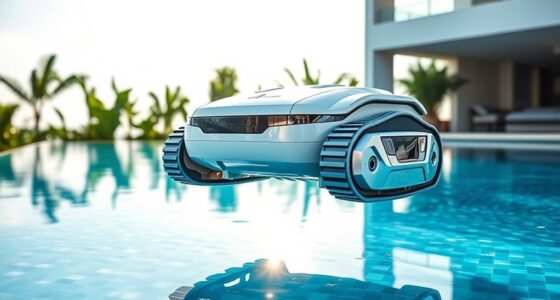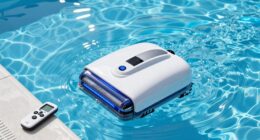Automatic pool cleaners boost circulation by tirelessly moving across the surface and floor, preventing debris buildup and stagnation zones. They help keep water flowing evenly, which promotes better chemical distribution and reduces algae growth. By actively removing dirt and circulating water, they improve clarity and overall quality. Proper choice, installation, and maintenance guarantee ideal results. If you want to learn how to maximize their benefits for your pool, you’ll find useful tips here.
Key Takeaways
- Automatic cleaners systematically cover the pool surface, preventing debris buildup and ensuring even water circulation.
- They actively move water, reducing stagnation zones and promoting better flow throughout the pool.
- Consistent operation helps distribute chemicals evenly, maintaining balanced pH and preventing algae growth.
- By reducing debris and algae, they improve water clarity and reduce strain on filtration systems.
- Proper circulation from cleaners enhances oxygen levels, supporting healthier water chemistry and longer equipment lifespan.
How Automatic Pool Cleaners Enhance Debris Removal
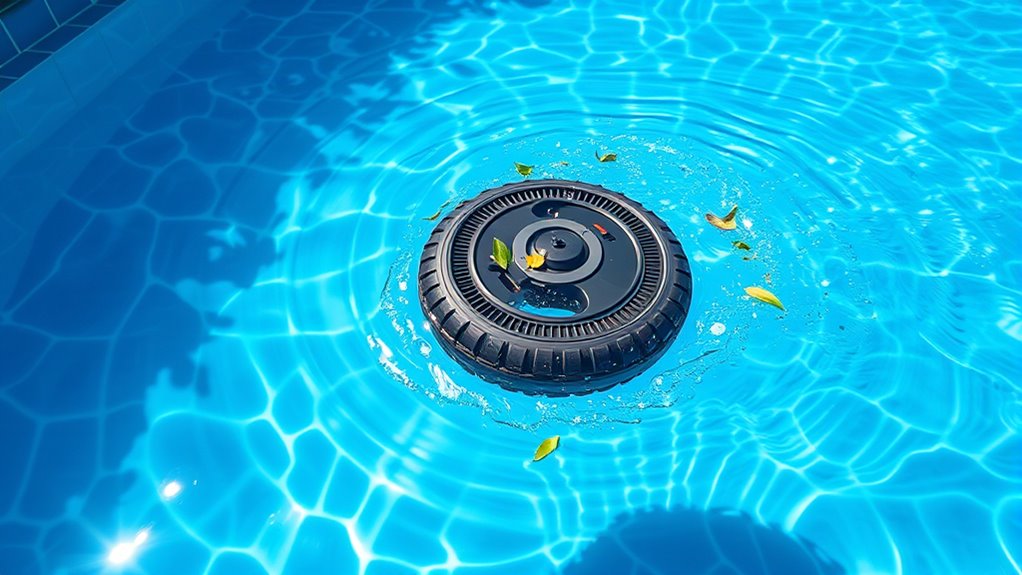
Automatic pool cleaners substantially improve debris removal by targeting dirt, leaves, and other particles more efficiently than manual cleaning. They systematically cover the pool surface, ensuring no area is missed, which helps maintain a cleaner, healthier environment. These cleaners are especially effective when water temperature fluctuates, as warmer water can encourage algae and bacteria growth, making debris removal even more critical. By consistently removing debris from the pool surface, the cleaners prevent particles from sinking to the bottom, reducing the need for manual skimming and vacuuming. This continuous cleaning process keeps your pool looking pristine and reduces chemical use. With automatic cleaners, you gain better control over debris, leading to a more inviting and comfortable swimming experience.
The Role of Pool Cleaners in Circulation Efficiency
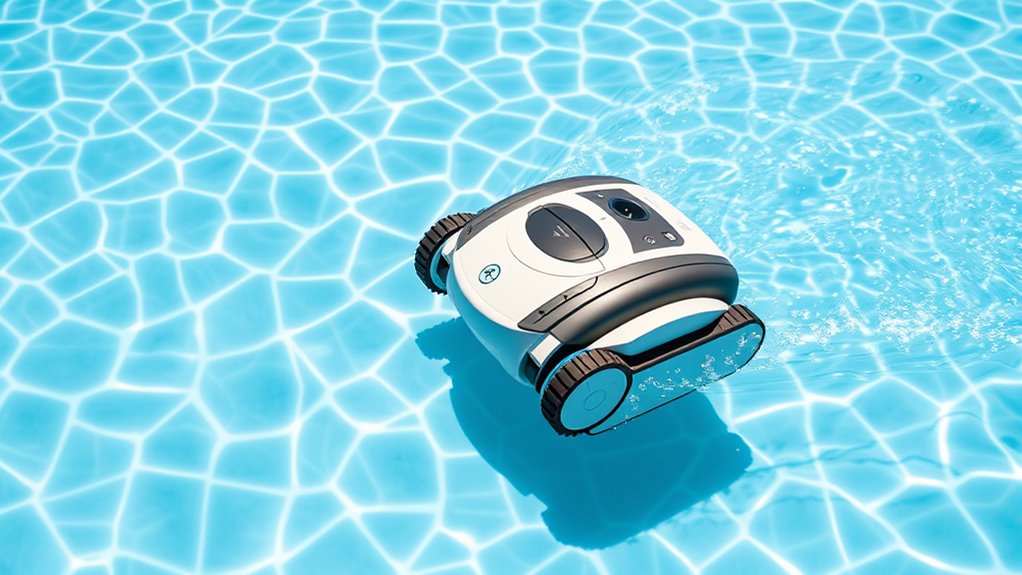
Effective debris removal by pool cleaners not only keeps your water clean but also plays an essential role in maintaining proper circulation. When your cleaner tackles the pool surface, it prevents debris from settling and blocking water flow, ensuring even circulation throughout the pool. A clean surface reduces stagnation zones, allowing water to move freely and distribute chemicals more effectively. This improves chemical balancing by preventing localized pH imbalances and algae growth. When debris is managed efficiently, your pool’s filtration system works more effectively, reducing strain and energy use. Properly maintained equipment and reliable power sources are crucial for optimal operation. Regular maintenance and system checks can also prevent unexpected breakdowns that disrupt circulation. Additionally, integrating advanced tuning techniques can enhance the efficiency of your pool’s circulation system, ensuring consistent water quality. Implementing automatic cleaning systems can further optimize debris removal and circulation. Furthermore, utilizing efficient pump systems can significantly improve overall water movement. Overall, a well-maintained surface combined with a quality pool cleaner promotes consistent water flow, which is vital for ideal circulation and maintaining clear, healthy water.
Improving Water Flow With Robotic and Suction Cleaners

Robotic and suction cleaners help improve water flow by actively circulating water throughout your pool. This movement reduces dead spots where debris tends to settle. As a result, your pool stays cleaner and more evenly circulated. Additionally, these cleaners can help maintain optimal water quality by reducing algae growth and preventing the buildup of contaminants. Proper maintenance of your pool’s water circulation system ensures these benefits are maximized and extends the lifespan of your equipment. Regularly upgrading components like performance parts can further enhance the efficiency of your circulation system. Incorporating Volkswagen Tuning techniques, such as engine optimizations, can also be applied to improve the overall efficiency of your pool’s systems, ensuring better performance and longevity of your equipment.
Enhanced Water Movement
To enhance water movement in your pool, modern cleaners focus on improving water flow through advanced robotic and suction technologies. These systems help optimize pool cover efficiency by reducing debris buildup and ensuring consistent circulation. Better water movement also boosts skimmer performance, allowing it to capture dirt and leaves more effectively. As a result, your pool stays cleaner, and water quality improves. Robotic cleaners navigate all areas, preventing stagnation and dead zones that hinder circulation. Proper maintenance practices ensure these systems operate at peak efficiency and longevity. Additionally, maintaining pump and filter systems is crucial for optimal water flow and quality. By maintaining steady flow, they help distribute chemicals evenly and prevent algae growth. Overall, these innovations enable your pool to stay clearer, healthier, and more inviting with less effort on your part. Enhanced water movement is essential for a balanced, well-maintained swimming environment.
Reduced Dead Spots
Even though some areas of your pool can become stagnant, modern robotic and suction cleaners target these dead spots directly. By improving water flow, they enhance pool cover efficiency and water temperature regulation. These cleaners systematically move through tricky corners and low-flow zones, preventing debris buildup and stagnation. As a result, circulation improves, reducing algae growth and ensuring even distribution of chemicals. Better water movement also helps maintain consistent temperature levels, making your pool more comfortable. Additionally, incorporating performance upgrades like specialized nozzles or enhanced suction power can further optimize circulation and cleaning efficiency. Proper water circulation is essential for maintaining overall water quality and preventing long-term issues, especially considering that proper circulation supports overall pool health and reduces maintenance needs. Enhancing pool water flow with automatic cleaners can also extend the lifespan of your pool equipment by reducing strain caused by stagnant water.
The Impact of Cleaners on Preventing Algae Growth
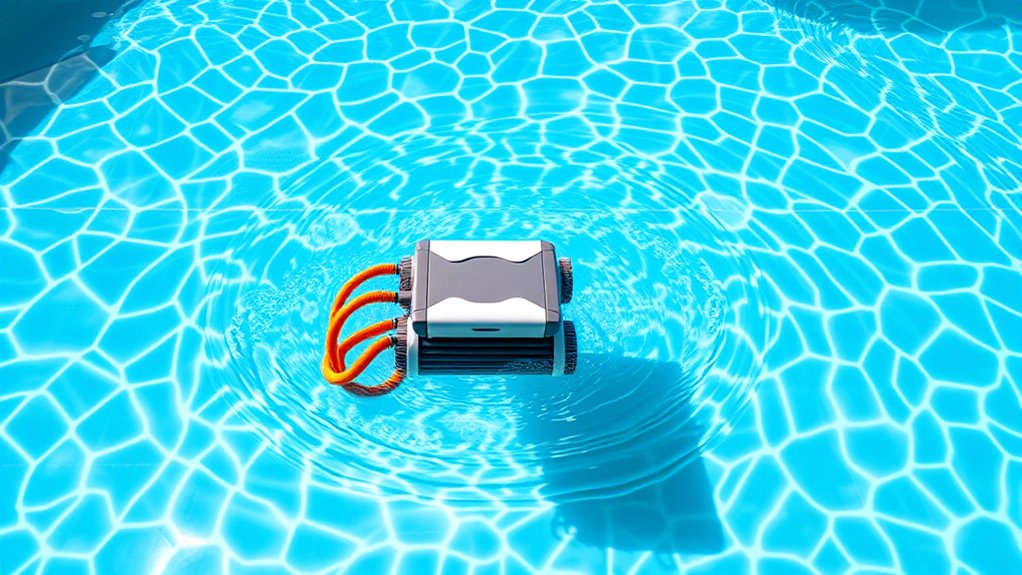
Automatic pool cleaners play a crucial role in preventing algae growth by continuously circulating and filtering the water. When water moves consistently, it discourages algae from settling and multiplying, contributing to better pool safety by reducing slippery surfaces and bacteria buildup. These cleaners help maintain ideal water flow, which supports effective filtration and keeps nutrients that algae feed on at bay. Additionally, because they operate efficiently, they use less energy than manual cleaning methods, making them an energy-efficient choice. Regular operation of these cleaners also promotes improved water circulation, which is vital for overall water quality. Properly maintained filtration systems work synergistically with automatic cleaners to enhance water clarity and hygiene. Implementing automation in water management can further optimize pool maintenance routines, ensuring consistent water quality. Maintaining proper water testing and adjusting chemical levels further supports algae prevention efforts. With cleaner, well-circulated water, you’ll spend less time scrubbing algae and more time enjoying your pool. Overall, automatic pool cleaners are essential for maintaining a healthy, safe, and algae-free swimming environment.
How Pool Cleaners Help Maintain Chemical Balance
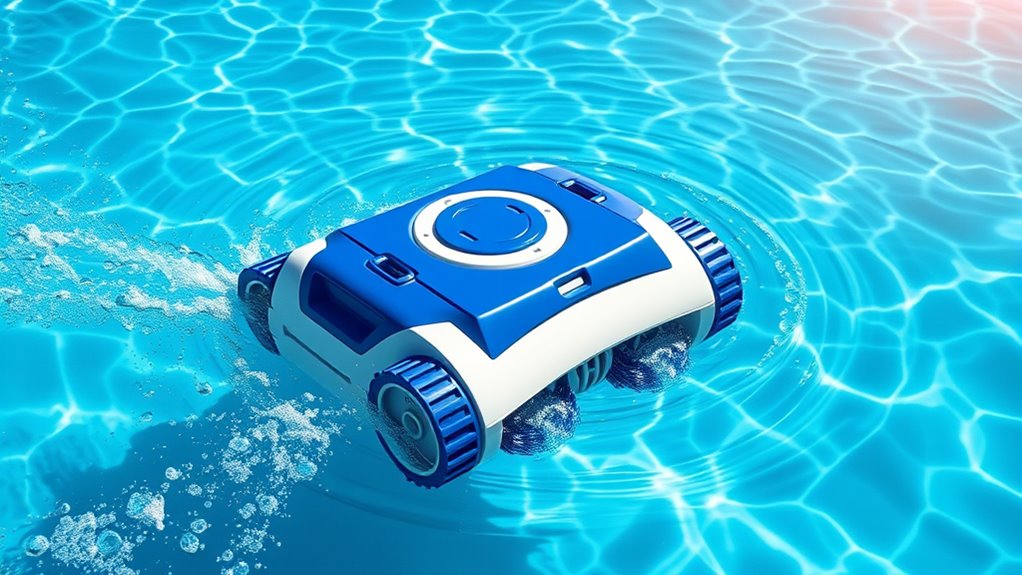
Automatic pool cleaners help keep your water’s chemical balance in check by distributing chemicals evenly throughout the pool. This consistent circulation reduces the risk of imbalances that can lead to cloudy water or algae growth. When chemicals are spread properly, maintaining clear, healthy water becomes much easier. Additionally, effective circulation helps prevent stagnant water, which can harbor bacteria and mold. Proper circulation also supports the action of essential oils for water quality, enhancing overall water health and clarity. For improved performance, ensuring your pool’s headphones are compatible with your cleaning equipment can be beneficial, especially if you use Bluetooth-enabled devices around your pool area. Regular water testing is essential to monitor and maintain optimal chemical levels, further supporting healthy circulation and water quality. Inspired by the importance of inspirational quotes about fatherhood, many pool owners find that regular maintenance and circulation foster a more relaxing and enjoyable swimming environment.
Consistent Chemical Distribution
Pool cleaners play a pivotal role in maintaining consistent chemical distribution, guaranteeing your pool stays balanced and safe. They help evenly spread chemicals, promoting pH stability and mineral balance across the entire pool. This prevents areas of high or low chemical concentration, reducing potential problems like algae growth or corrosion. By circulating water effectively, automatic cleaners guarantee chemicals are dispersed uniformly, maintaining ideal water quality. Regular operation keeps the chemical levels consistent, avoiding sudden shifts that can harm swimmers or damage equipment.
- Even distribution of pH adjusters and sanitizers
- Prevention of chemical hotspots
- Reduced risk of algae and bacteria growth
- Improved mineral balance throughout the pool
- Consistent water clarity and safety
Reduces Chemical Imbalances
By guaranteeing chemicals are evenly distributed, pool cleaners directly help prevent imbalances that can lead to cloudy water, algae blooms, or corrosion. When circulation is improved, maintaining proper chemical pH and mineral balance becomes easier. Consistent movement helps prevent localized pH fluctuations that can harm your pool’s water quality. To illustrate, consider this table:
| Chemical Aspect | Impact of Imbalance | How Pool Cleaners Help |
|---|---|---|
| pH Levels | Causes cloudy water, skin irritation | Distributes chemicals evenly, stabilizing pH |
| Mineral Balance | Leads to scaling or corrosion | Promotes uniform mineral dispersion |
| Chlorine Levels | Results in algae growth or bacteria | Ensures consistent sanitizer distribution |
This active circulation keeps your pool’s chemistry stable, reducing the risk of imbalances.
The Benefits of Consistent Water Movement

Consistent water movement is essential for maintaining a clean and healthy swimming environment. It promotes water aeration, which increases oxygen levels and helps break down contaminants. Proper circulation patterns ensure all areas of your pool are evenly cleaned and filtered, preventing stagnation. When water moves steadily, debris is less likely to settle, and algae growth is minimized. Automatic pool cleaners help establish these consistent circulation patterns effortlessly.
- Improves water clarity and quality
- Prevents algae and bacteria buildup
- Promotes better chemical distribution
- Enhances water aeration for healthier water
- Reduces algae and bacteria growth risks
Choosing the Right Cleaner for Optimal Circulation
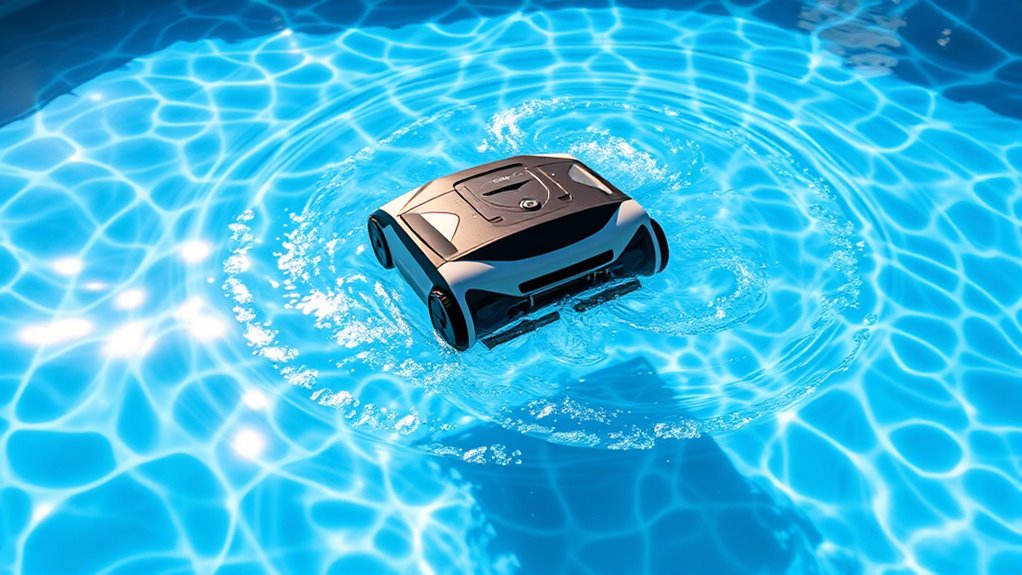
Choosing the right automatic pool cleaner is essential for achieving peak circulation and maintaining a clean, healthy swimming environment. If you have a pool cover, opt for a cleaner that can navigate around it effectively, ensuring thorough coverage even when access is limited. Consider your water temperature, as warmer water may cause debris to move more quickly, so a powerful cleaner with adjustable settings can help maintain ideal circulation. Different cleaners excel at handling specific conditions—pressure-side cleaners work well in pools with higher water temperatures, while robotic cleaners offer precise targeting and better coverage. By selecting a cleaner suited to your pool’s features and environment, you promote better water movement, reduce stagnation, and support consistent circulation for improved water clarity and quality.
Installation and Operation Tips for Better Water Quality
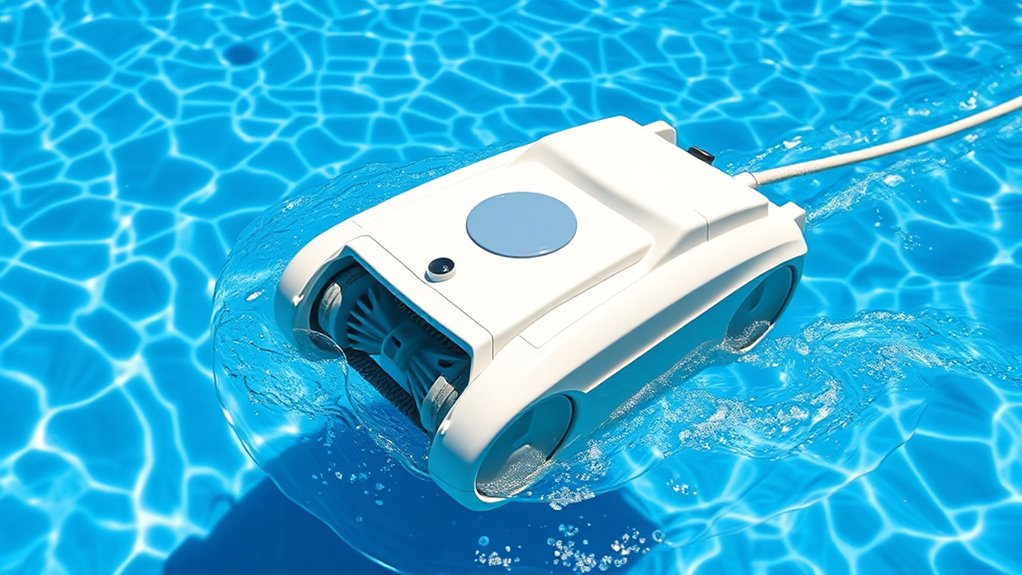
Proper installation and operation of your automatic pool cleaner are key to maintaining water quality. Verify the equipment placement is correct to avoid damaging your pool liner and to maximize cleaning efficiency. Regularly check that the cleaner’s path covers all areas, including corners and along the walls. Keep the filter clean to prevent clogs that could hinder circulation. Adjust the cleaner’s settings based on pool size and debris levels for better results. Avoid placing the cleaner near delicate fixtures or shallow areas. Use these tips to enhance performance and water clarity:
Properly install and operate your pool cleaner to protect your liner and ensure optimal water clarity.
- Position the cleaner to cover all pool zones evenly
- Avoid obstructing the cleaner’s path with pool toys or furniture
- Regularly inspect and clean the filter system
- Verify proper equipment placement to protect the pool liner
- Adjust cleaning schedules seasonally for peak water quality
Comparing Different Types of Automatic Pool Cleaners
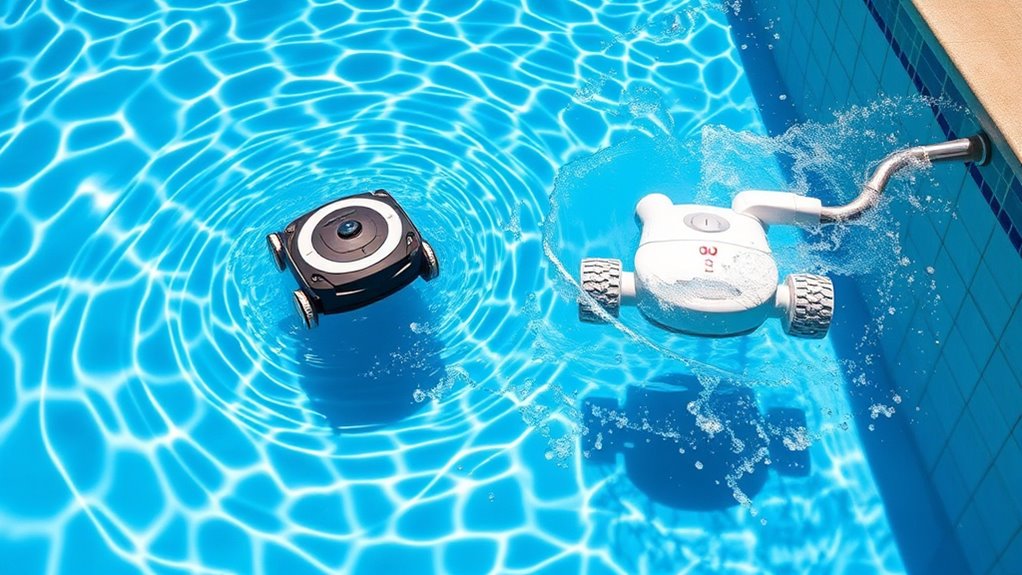
When choosing an automatic pool cleaner, you need to compare different types like robotic, suction, pressure, and hybrid models. Each offers unique benefits and drawbacks regarding cleaning performance, cost, and maintenance. Understanding these differences helps you pick the best option for your pool and budget.
Robotic vs. Suction Models
Robotic and suction pool cleaners each offer distinct advantages, making it important to understand their differences to find the best fit for your pool. Robotic cleaners are autonomous, often more energy-efficient, and excel at thorough cleaning, promoting better water quality and circulation. They typically enhance pool safety by reducing manual effort and minimizing hazards. Suction models attach to your pool’s skimmer or dedicated suction line, offering a more budget-friendly option but may require more manual oversight. Consider these points:
- Robotic cleaners are energy-efficient and autonomous.
- Suction models are generally less expensive upfront.
- Robotic units often cover more area with minimal supervision.
- Suction cleaners depend on your pool’s existing pump system.
- Both improve circulation, but robotic cleaners offer better pool safety features.
Choosing the right model depends on your priorities and pool setup.
Pressure vs. Hybrid Cleaners
Pressure cleaners and hybrid models each bring unique benefits to pool maintenance, making it important to compare their features to determine the best fit. Pressure cleaners use high-pressure water to propel themselves, covering large areas quickly and effectively. Hybrid cleaners combine pressure and suction methods, offering greater versatility and thorough cleaning. When choosing, consider energy efficiency and pool safety. Hybrid models often consume less energy because they adapt to your pool’s needs, reducing unnecessary operation. The table below highlights key differences:
| Feature | Pressure Cleaners | Hybrid Cleaners |
|---|---|---|
| Energy Efficiency | Moderate | High |
| Pool Safety | Good | Excellent |
| Cleaning Scope | Large Area | Versatile |
| Maintenance | Moderate | Lower |
Choosing the right cleaner improves circulation and water quality without sacrificing safety or energy savings.
Cost and Maintenance Factors
Choosing the right automatic pool cleaner involves carefully comparing their costs and ongoing maintenance requirements. Your initial investment varies depending on the type, with robotic cleaners generally costing more upfront but offering better energy efficiency. Maintenance needs differ: some models require regular filter cleaning, while others have parts that may need periodic replacement. Consider how often you’ll need to service your cleaner and the associated costs.
- Initial purchase price
- Energy efficiency over time
- Filter or part replacement frequency
- Ease of cleaning and servicing
- Power consumption and running costs
Regular Maintenance for Sustained Water Health

Regular maintenance is essential to keep your pool water clean and healthy over time. You should regularly check and adjust your pool chemistry to maintain proper pH, alkalinity, and sanitizer levels. This prevents algae growth and keeps the water clear. Additionally, filter maintenance plays a crucial role; clean or replace filters as recommended to guarantee optimal circulation and debris removal. A well-maintained filter helps your automatic pool cleaner work efficiently by preventing clogs and maintaining water flow. Consistently monitoring these factors not only prolongs the lifespan of your equipment but also guarantees your water remains safe and inviting. By staying on top of pool chemistry and filter maintenance, you’ll enjoy cleaner, healthier water with less effort and fewer issues down the line.
Frequently Asked Questions
How Do Automatic Pool Cleaners Affect Overall Energy Consumption?
Automatic pool cleaners can reduce your overall energy consumption by promoting efficient water circulation, which keeps your pool cleaner and reduces the need for additional filtration. They are designed for eco-friendly operation, using less power compared to traditional methods. By maintaining ideal water flow and cleanliness, they help you save energy, lower utility bills, and support environmentally conscious pool maintenance. This makes them a smart, energy-efficient choice for pool owners like you.
Can Automatic Pool Cleaners Reduce Chemical Usage Over Time?
Yes, automatic pool cleaners can help reduce chemical usage over time. By improving pool circulation and water filtration, they keep the water clearer and more balanced, maintaining ideal pool chemistry. As a result, you’ll need fewer chemicals like chlorine and algaecides, saving you money and reducing chemical exposure. Regular cleaning ensures consistent water quality, making your pool safer and more inviting without over-relying on chemical treatments.
Do Automatic Pool Cleaners Work Effectively in All Pool Shapes and Sizes?
Think of automatic pool cleaners as versatile dancers on your pool’s stage, but their performance depends on the shape and size of your pool. They adapt well to many pool shapes, gracefully maneuvering corners and curves, yet size limitations can affect their efficiency. Larger pools might require multiple cleanings or specialized models, while small pools are easily tamed. So, yes, they work effectively—if you choose a model suited to your pool’s unique dance floor.
How Often Should I Schedule Maintenance for Optimal Performance?
You should schedule pool filter maintenance and debris bag cleaning weekly to keep your automatic pool cleaner performing at its best. Regular maintenance prevents clogs, ensures proper circulation, and maintains water quality. Check the debris bag for buildup and clean your pool filter according to the manufacturer’s instructions. Consistent upkeep helps your cleaner work efficiently, extends its lifespan, and keeps your pool water clear and healthy for swimming.
Are There Specific Features to Look for in High-Quality Pool Cleaners?
When choosing a high-quality pool cleaner, look for advanced features like multiple filter types to efficiently trap debris and guarantee cleaner water. Navigation systems are vital—they help the cleaner cover the entire pool surface thoroughly. You want a model with smart routing and obstacle detection for better coverage. These features make maintenance easier, improve circulation, and keep your pool water clear and inviting.
Conclusion
By choosing the right automatic pool cleaner, you’re not just maintaining your pool—you’re ensuring it breathes with vibrant life. Like a diligent guardian, it tirelessly promotes circulation, keeps debris at bay, and prevents algae from taking hold. Embrace these smart devices, and watch your water transform into a crystal-clear oasis. After all, a well-maintained pool isn’t just a luxury; it’s a reflection of your care—your secret to endless summer serenity.
